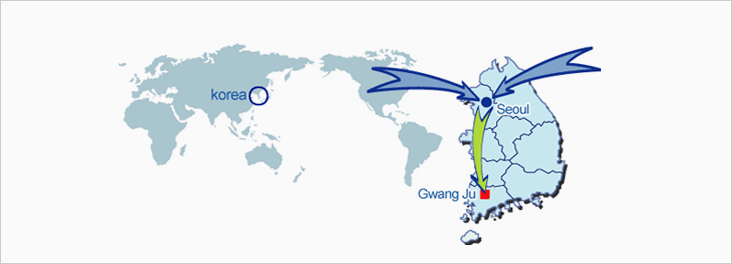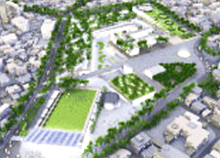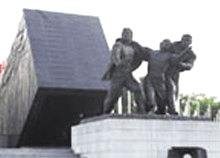Chamber Jurisdiction
THE CITY LIGHT WITH DREAMS WHERE ALL ARE OWNERS GWNGJU THE MECCA OF THE PHOTONICS INDUSTRY
Gwangju
Gwangju
Gwangju CCI
Nature
- Gwangju Metropolitan City is located in central Honam, which is in the southwest of the Korean peninsula, the center of Northeast Asia. It borders Damyang-gun on the northeast, Jangseong-gun on the north, Hampyeong on the west, Naju city on the south, and Hwasun on the southeast. Along with Seoul, Busan, Daegu, and Incheon, it is one of the largest cities in Korea and is the metropolitan city that represents the southwestern region.

- Gwangju extends from Nam-gu Seungchon-dong (35˚03'13" north latitude) in the south to Sanpo-smyeon, Youngsan River to Buk-gu Yongkang-dong (35˚15'22" north latitude) in the north. On the east side of Biseonggul, Buk-gu Chunghyo-dong forms the eastern boundary (127˚00'34" east longitude) of the city. The city extends 34.3km from east to west and 23.1km from north to south.
- Cities located on a similar latitude are Busan and Jinhae in Korea, and Tokyo in Japan, Jungsen in China, Algiers in Algeria, and Oklahoma City in the US. Seoul is located in a similar longitude.
- Geographically, Gwangju is situated in the north of Jeollanam-do, centered in Honnam province, serving as a hub of economy, administration, education, and culture including some parts of Jeonbuk. Geographically, Gwangju is situated in the north of Jeolla province, centered in Honnam province, serving as a hub of economy, administration, education, and culture including some parts of Jeonbuk. Surrounding Gwangju, there has been development toward Mokpo going through agricultural areas and toward Wondo in terms of the bounty of agricultural products, toward Yeosu extending to Gwangyang international container port, and toward Namwon connecting Yeongnam. Likewise, Gwangju is located in the center of the 6 directions of the Honnam region, providing the chance to geographically develop into the hub of Honnam province.
- The city is located in the median latitude maritime temperate climate zone. Its climate is somewhere in between the west coast climate and the continental climate but more similar to the west coast climate which means that the city is warm and has enough rainfall. Winter is freezing and dry and summer is hot and humid. It has 4 distinct seasons. Recently, due to climate change, spring and fall have been shorter, causing characteristics of a semi-tropical climate.
- In terms of traffic access, it has a well-established the transportation environment ranging from air, railway and express bus within one day's drive to major cities including Seoul, Incheon, and Busan. It takes 55 minutes to travel the 290.9km from Gwangju to Seoul by air, 3 hours by the KTX(Korean Train Express), and 3.5 hours by car. Incheon, which serves as the gate to Korea, is 311.4km from Gwangju and it takes about 4 hours and 10 minutes to get from Incheon to Gwangju. The distance between Gwangju and Busan is 286.8km and it takes 3 hours and 50 minutes.
- Historically Gwangju cultivates a mental and cultural environment as a city of spirit, art and taste. It is a city of democracy, human rights, and peace and has shown its spirit in many movements including those in the late Joseon Dynasty, the Gwangju Students Independence movement during the Japanese occupation of Korea, and the May 18 Gwangju Democratic Movement. In addition, Gwangju is a city of art and is moving forward as a hub of culture in Asia following the hosting of the Gwangju Biennale and Design Biennale, which are international cultural festivals. Along with this, Gwangju has developed as 21st Northeast Asia by nurturing the next generation of strategic industries represented by the LED industry, New Energy industry, and cultural content industry.
Overview
- Environmentally-Friendly Cutting-edge City, a Hub of Asian Culture
-
 Gwangju is the leading city of the Honam region, which is being sought for its cutting-edge industry and culture, and a core middle city leading the development of the southwestern region. For a long time Gwangju has been known as a hometown of justice, art and beauty because citizens have never turned a blind eye to injustice and enjoy art, flavor and taste.
Gwangju is the leading city of the Honam region, which is being sought for its cutting-edge industry and culture, and a core middle city leading the development of the southwestern region. For a long time Gwangju has been known as a hometown of justice, art and beauty because citizens have never turned a blind eye to injustice and enjoy art, flavor and taste. - A Sacred Land of Democratization and a City of Democracy, Human Rights, Peace
-
 The history of this virtuous village continued from the honorable troops movement in the late Korean Kingdom to the Gwangju Student Independence Movement and the May 18th, Gwangju Democratization Movement. As a result, Gwangju has been recognized as a city of democracy, human rights, and peace. In particular, the May 18 Democratizaton Movement, in resistance against military rule, set an example for many Asian countries who are aspiring freedom and justice. The Nobel Peace Prize Laureate Summit and a Women's Forum in 2006 and 2007 respectively offered opportunities to raise awareness about the spirit of Gwangju, democracy, human rights, and peace around the world.
The history of this virtuous village continued from the honorable troops movement in the late Korean Kingdom to the Gwangju Student Independence Movement and the May 18th, Gwangju Democratization Movement. As a result, Gwangju has been recognized as a city of democracy, human rights, and peace. In particular, the May 18 Democratizaton Movement, in resistance against military rule, set an example for many Asian countries who are aspiring freedom and justice. The Nobel Peace Prize Laureate Summit and a Women's Forum in 2006 and 2007 respectively offered opportunities to raise awareness about the spirit of Gwangju, democracy, human rights, and peace around the world. - A Window on Asian Culture and a Cultural Hub of the World
-
 Gwangju is a city of the arts and has giben birth to many artists including masters of pansori, a traditional Korean song, Lim Bangul, Oriental painter Uijae Huh Baekryun, Chinese modern musician, Chung Uelsung, and poet Park Youngchul. On top of this, Gwangju hosts the Gwangju Biennale and the Design Biennale, which are international festivals of modern art and design, transforming itself as a cultural hub of Asia. Gwangju, with this cultural competitiveness, has tried to renew itself as a hub of Asian culture through a long-term project (from 2003 to 2023). If the National Asian Culture Hall opens to the level of Pompidou in 2012, Gwangju will move toward being the cultural hub of the world. *5 major festivals of Gwangju: Gwangju Biennale, Gwangju Design Biennale, Gwangju Kimchi Festival, Im Bangul Korean Traditional Music Festival, and Gwangju Jeong Yul-seong International Music Festival.
Gwangju is a city of the arts and has giben birth to many artists including masters of pansori, a traditional Korean song, Lim Bangul, Oriental painter Uijae Huh Baekryun, Chinese modern musician, Chung Uelsung, and poet Park Youngchul. On top of this, Gwangju hosts the Gwangju Biennale and the Design Biennale, which are international festivals of modern art and design, transforming itself as a cultural hub of Asia. Gwangju, with this cultural competitiveness, has tried to renew itself as a hub of Asian culture through a long-term project (from 2003 to 2023). If the National Asian Culture Hall opens to the level of Pompidou in 2012, Gwangju will move toward being the cultural hub of the world. *5 major festivals of Gwangju: Gwangju Biennale, Gwangju Design Biennale, Gwangju Kimchi Festival, Im Bangul Korean Traditional Music Festival, and Gwangju Jeong Yul-seong International Music Festival. - Environmentally-friendly High Tech Industrial City, and a Science Park in Northeast Asia
-
 Gwangju is opening a new era with the environmentally-friendly future high tech industry. It has nurtured next generation strategic industries such as high tech components, new energy, design and culture content along with automobiles, digital electronics, and photonics, developing as a high tech industrial area in 21st Century Northeast Asia. In addition, Gwangju has planted about 10 million trees all across the city, and became the first city to forge a UN City Environment Convention in Korea in order to cut greenhouse gases and make itself a green city. Gwangju, with its harmony among culture, nature, and industry, has tried to realize the dream of being a global city that attracts attention in the 21st Century. Gwangju's global events: 2009 international Photonics Expo, 2011 International Environment Expo, 2014 World Hydrogen Energy Convention, 2015 Summer Universiade
Gwangju is opening a new era with the environmentally-friendly future high tech industry. It has nurtured next generation strategic industries such as high tech components, new energy, design and culture content along with automobiles, digital electronics, and photonics, developing as a high tech industrial area in 21st Century Northeast Asia. In addition, Gwangju has planted about 10 million trees all across the city, and became the first city to forge a UN City Environment Convention in Korea in order to cut greenhouse gases and make itself a green city. Gwangju, with its harmony among culture, nature, and industry, has tried to realize the dream of being a global city that attracts attention in the 21st Century. Gwangju's global events: 2009 international Photonics Expo, 2011 International Environment Expo, 2014 World Hydrogen Energy Convention, 2015 Summer Universiade


